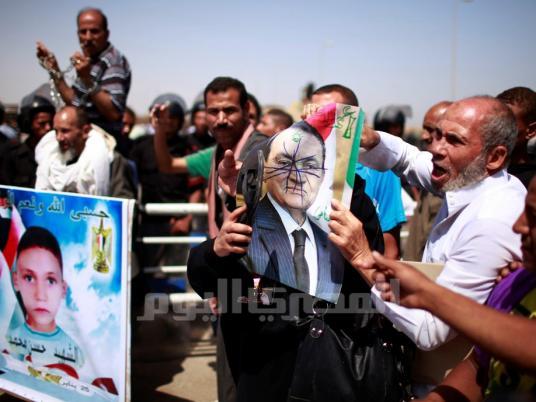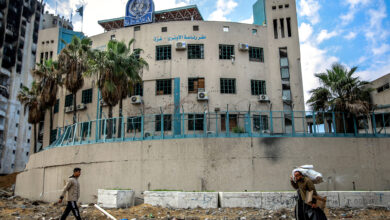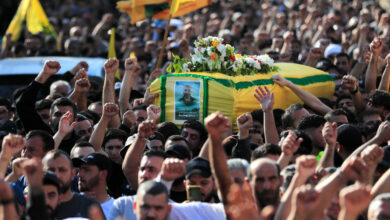
“What resonates most with the Egyptian people these days? Anything that smells like gallows. Oh, and Islam too,” writes prominent Israeli journalist Boaz Bismuth in the right-wing newspaper Israel Hayom.
Following the announcement of former President Hosni Mubarak’s verdict on Saturday, Israeli commentators have lamented Egyptians’ craving for revenge, and praised Egypt’s judicial system for its perceived refusal to give in.
Mubarak and former Interior Ministry Habib al-Adly were sentenced to prison for life, while six former senior Interior Ministry officials were acquitted and Mubarak’s sons were found innocent of corruption charges.
“The head of Mubarak had to be given to the Egyptian masses who, if they had their way, would have chosen nothing less than a hanging,” says writer Aviad Pohoryles in an op-ed for Maariv, a Hebrew daily. “In order for Egypt to enter a new era, Mubarak had to pay the price. An acquittal would have created a bloodbath that Egypt hasn’t yet seen.”
Since the verdict was announced, thousands have protested in Cairo’s Tahrir Square and elsewhere throughout Egypt to express their dissatisfaction.
Ehud Yaari, an Arab affairs commentator for Channel 2 news, Israel’s most popular television network, commends the judges for not giving into popular pressure. “One must salute these judges in Cairo who didn’t fear to give this ruling … it’s not an easy thing,” he says. The Egyptian judicial system “did not surrender this morning to groans of revenge coming from the Egyptian street and surprised us all with a sentence that was measured and unpredictable.”
In August last year when the trial began, Yaari, along with many other Israeli commentators, lamented the proceedings and heaped blame for them on Egypt’s ruling military council. Tantawi, who has been “nicknamed Mubarak’s poodle, sent his poor boss to that cage,” he said at the time. The military’s decision demonstrated its “weakness” and “lack of self-confidence when confronted by the anger of the Egyptian street.”
But what started as a show trial invented to satisfy the public’s thirst for blood evidently transformed into a genuine legal proceeding that held Mubarak to account without going overboard, he believes. Yaari explains in the news broadcast that the judge “bravely” told the prosecutors the truth: that they had failed to provide the evidence necessary to support their contention that Mubarak and Adly had given orders to kill protesters.
The newscast shows Egyptians saying they are unhappy with the trial because they wanted to see Mubarak executed. The left-leaning Haaretz notes protesters in Tahrir Square chanting: "The nation wants to put the president to death," while ignoring those elsewhere who welcomed Mubarak’s verdict.
The fact that many Egyptians are upset that Mubarak’s sons and other high-ranking officials were acquitted of corruption charges does not get much attention on Channel 2 or elsewhere in the Israeli media. Rather, Israeli commentators give the impression that the public’s rage is almost solely directed at the Mubarak verdict, when in fact Western and Egypt media outlets have reported that many Egyptians were satisfied with Mubarak’s ruling but simultaneously angered by the acquittal of his sons and other ex-officials.
In an editorial, Haaretz also commends the court but emphasizes the public’s disappointment, again focusing on popular cries for execution.
“The ‘public’ wanted death,” writes Zvi Barel in a news article in Haaretz. “It is doubtful whether any judgment other than the death penalty would have satisfied the longing for revenge that is felt widely among the Egyptian public.”
In an editorial, Haaretz reiterates: “The public wanted ‘the trial of the century’ … a trial that would hold Mubarak to account for 30 years of oppression and corruption.”
It acknowledges the inherent contradiction between upholding the rule of law — in this case respecting the court’s decision — and bringing Mubarak regime figures to justice. The degree to which the Egyptian public allows its feelings of revenge to dominate politics will serve as a barometer for revolution’s success, as any democracy must respect the rule of law.
“In two weeks, the Egyptian revolution will be complete when the new president is elected. One hopes that this great country won’t find itself missing the rule of its imprisoned former president,” the editorial says.
In an op-ed in Yedioth Ahronoth, Israel’s most widely read daily, Israeli writer Yaron Friedman frames the election as a choice between revenge and mercy, execution and amnesty.
“The Egyptian public will choose between Muslim Brotherhood law and the decision of an old regime figure, between revenge and mercy, between execution and amnesty,” he writes.
Mohamed Morsy, a Muslim Brotherhood candidate, and Ahmed Shafiq, Mubarak’s last prime minister, are slated to compete in a presidential runoff on 16 and 17 June. Discontent with the verdict has turned the fate of Mubarak and his cronies into a political issue for the election.
For Friedman, mercy and amnesty — Shafiq, in other words — is the right choice.
“The revolutionary youth and Muslim Brothers … aren’t aware of Mubarak’s historical contribution to the Egyptian people. They weren’t yet born when Mubarak rehabilitated Egypt’s air force following the Six Day War [1967 Arab-Israeli War].”




